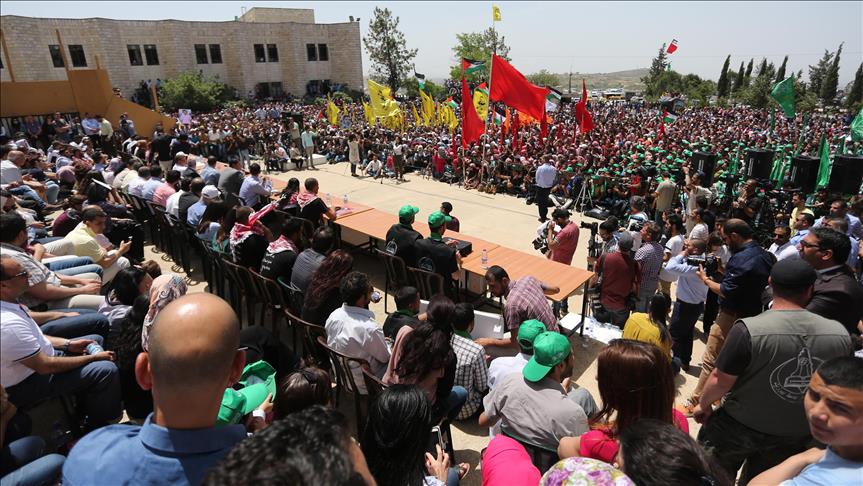Palestinian students fired up for university elections
Thousands of Palestinian students gather for student election debates that some say reflect Palestinian public opinion

Ramallah
By Kaamil Ahmed
BIRZEIT, Palestine
At its highest point on an unusually hot day, even the sun could not temper the full-throated enthusiasm of the student leaders at Palestine's Birzeit University as they debated in front of thousands on Tuesday for hotly-contested student elections.
At either extreme of the debating platform, students backing the two leading Palestinian factions, Fatah and Hamas, leveled allegations against each other over their parties' respective governing of the West Bank and Gaza Strip, while the leftists and others wedged in between sought to cut down both.
Students, some in the crowds and others leaning from the windows of nearby buildings, laughed and cheered as Hamas sent a bag of lemons toward the Fatah team - a dig at a song on Palestinian state TV that encouraged Palestinians to grow lemons instead of joining clashes with Israeli forces - while the Fatah students sought to defend their credentials as the party of popular late President Yasser Arafat.
Wednesday will see students choose between six voting blocs for the 51-seat student council, in a process that many view as one of the rare platforms for Palestinian political parties to have open debates in the absence of any elections since 2006.
They are also a direct contest between Fatah, who form the backbone of the Palestine Liberation Organization, and the Gaza-governing Hamas who edged out Fatah at last year's Birzeit election. All other university elections were later canceled.
Rawan Nabhan, a second year public administration student and Fatah supporter, told Anadolu Agency the way students vote "reflects the street, our opinions about the Palestinian government."
"All Palestine, all of the West Bank is just waiting [on our] elections. Here, everyone is not just from Ramallah, from Jerusalem, Nablus, Bethlehem, from everywhere," she said.
In believing the elections were representative, second year engineering student Jihad Arman agreed with her, saying that students provided a good sample of Palestinian public opinion because of the high proportion of youth in the population.
The Hamas supporter said he would vote for them because they provided students with study materials and whatever else they needed.
Arman also wanted closer cooperation between the parties – the ideal outcome of national unity talks between Hamas and Fatah.
"No one's with division. I think that anyone with [supporting] division has something wrong with their minds because us as Palestinians, there's no way we're going to find a way to end the occupation...while we're divided," he said.
English literature student Ammar Hamdan, who supported the left-wing People's Front for the Liberation of Palestine (PLFP), said, however, that the elections were not representative of the wider public and should not be so closely linked to mainstream politics.
He said that while the debates showed a struggle between the parties, the student leaders should be focused on helping students, especially those who need financial support to continue their studies.
After losing last year at one of the most liberal Palestinian universities, the secular nationalist Fatah might have attracted voters by funding a new bus and computer lab at the university, he said.
Watching the proceedings from the back of the crowd, Birzeit media professor Nashat Aqtash was skeptical about the importance of the elections, even if both the students and parties were placing importance on them.
"The political leaders, they think these elections might represent their popularity on the street, which is totally not true. You cannot judge the mood of the Palestinians from student elections," said Aqtash, noting that while Hamas took two-thirds of the vote in 2006's parliamentary elections, they had been equal with Fatah in the preceding student elections.
"Student politics is somehow affiliated to political parties, but you cannot judge this, you cannot measure this [against opinion on] the streets," he said.








